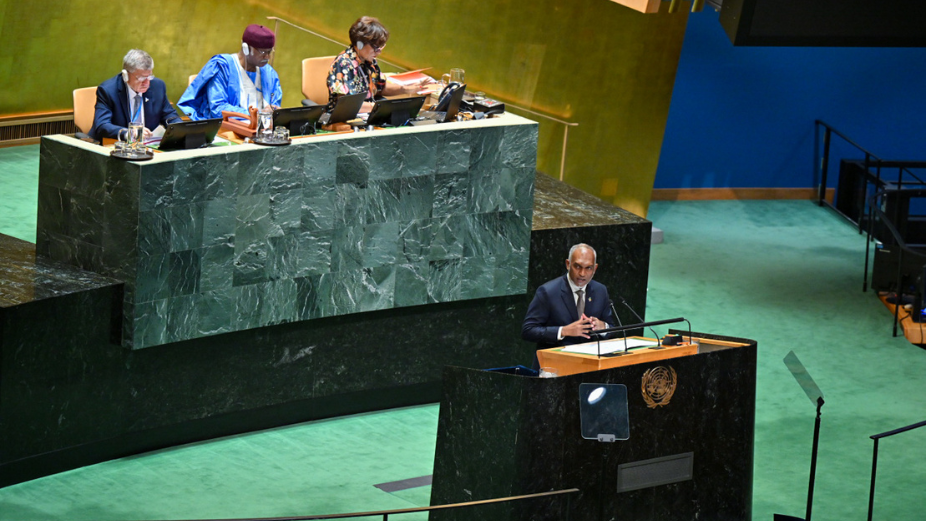
Addressing the Plenary of the United Nations Summit of the Future, President Dr Mohamed Muizzu made a compelling call for urgent global action on youth empowerment, climate change, and equitable financing. He challenged the international community to move beyond abstract resolutions and transform multilateralism into a tangible force that shapes global realities.
Speaking directly to UN Secretary-General António Guterres and world leaders, President Muizzu urged the United Nations to shake off its reputation as an “ivory tower” and become a “dynamic force” for change. “It is time to deliver,” he stated, referencing the Antigua and Barbuda Agenda for SIDS (Small Island Developing States) and the three outcome documents of the Summit. He stressed that these documents provide a vision that can be realised if world leaders commit to action.
Empowering Youth for a Digital Future
A significant portion of the President’s speech focused on the need to empower young people. He called for the declarations and agreements produced by the Summit to inspire the next generation, emphasising the importance of creating opportunities for youth to thrive.
“The Maldives understands that an enabling environment is key to true empowerment,” President Muizzu stated, sharing how his administration has taken steps to elevate the role of youth in governance, including the formation of a Presidential Youth Advisory Board.
He further highlighted the Maldives’ investment in digital infrastructure, stating, “Our vision is a Maldives where digital innovation is the engine driving economic opportunity and social equity.” According to President Muizzu, this infrastructure will enable young people to take control of their futures and unlock the power of their creativity.
Tackling Climate Change as a Global Imperative
President Muizzu underscored that the greatest threat to future generations is climate change, describing it as an urgent crisis requiring global cooperation. He drew attention to the devastating impact on Small Island Developing States, which have faced over $153 billion in damages due to extreme weather events in the last 50 years.
The President reiterated the Maldives’ commitment to combating climate change, stating that the country is on track to meet 33% of its electricity demand from renewable sources by 2028. He called upon all nations to uphold their commitments to climate adaptation and mitigation, as well as the protection of oceans and marine resources, urging, “Ignoring the 1.5°C target is not an option.”
Reforming Global Financing Mechanisms
Another key point in the President’s address was the need for reform in global financing systems, particularly for developing nations like the Maldives. He noted that the current system, meant to balance global inequalities, has become “tilted” and fails to provide adequate support to those who need it most.
President Muizzu emphasised that equitable, predictable, and sustainable financing is essential to bridging the annual investment gap of $2.5 to $4 trillion required to achieve the Sustainable Development Goals (SDGs). “We need a financial system that listens to everyone,” he said, calling for a system that works for all countries, particularly those most vulnerable to climate change.
A Call for Courage and Global Responsibility
As the Summit of the Future concluded, President Muizzu challenged world leaders to act with “courage” in addressing today’s most pressing global challenges. He urged for decisive action on the genocidal war in Gaza, advocating for full UN membership for the State of Palestine, and called for greater accountability for human rights violations.
“For the Maldives, and for every island, and for every soul dreaming of a better tomorrow, let us be the architects of that brighter future,” he concluded, reaffirming the Maldives’ commitment to turning the outcomes of the Summit into concrete actions.
The speech positioned the Maldives as a proactive voice at the Summit of the Future, urging the international community to prioritise action over rhetoric in addressing the most significant challenges of our time.












